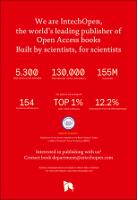Chapter Hyperglycemia-Induced Endothelial Dysfunction
Abstract
Glucose-induced endothelial dysfunction plays a fundamental role in the development of diabetic vascular complications and glycemic control (the foundation of diabetes care) provides limited protection against the cardiovascular complications. Therefore, identification of novel drug targets and treatment approaches for diabetes complications represent a key direction of current pharmaceutical research. The “unifying theory” of hyperglycemia-induced endothelial cell injury organizes the events of cellular dysfunction in a linear cascade and identifies mitochondrial superoxide generation as the triggering event of the injury. Exposure to high glucose concentration for long periods or repeated glycemic swings may induce changes in metabolic substrate availability and lead to mitochondrial hyperpolarization. Changes in the mitochondrial membrane potential induce superoxide production by the electron transport chain and result in oxidative stress. Mitochondrial superoxide is also responsible for the induction of other sources of reactive oxygen species (ROS) within the cells, including advanced glycation end products (AGEs) and the NADPH oxidase. Mitochondria also show morphological changes and impaired assembly of the respiratory complexes occurs, which results in cellular energy failure, cell senescence and vascular dysfunction. Current intervention strategies aim to inhibit the mitochondrial ROS production and novel therapeutic approaches are expected to provide valuable tools in diabetes therapy in the upcoming years.
Keywords
hyperglycemia, diabetes, endothelial cells, oxidative stress, mitochondria, electron transport chain, superoxide, bioenergeticsDOI
10.5772/intechopen.71433Publisher
InTechOpenPublisher website
https://www.intechopen.com/Publication date and place
2018Classification
Cardiovascular medicine


 Download
Download